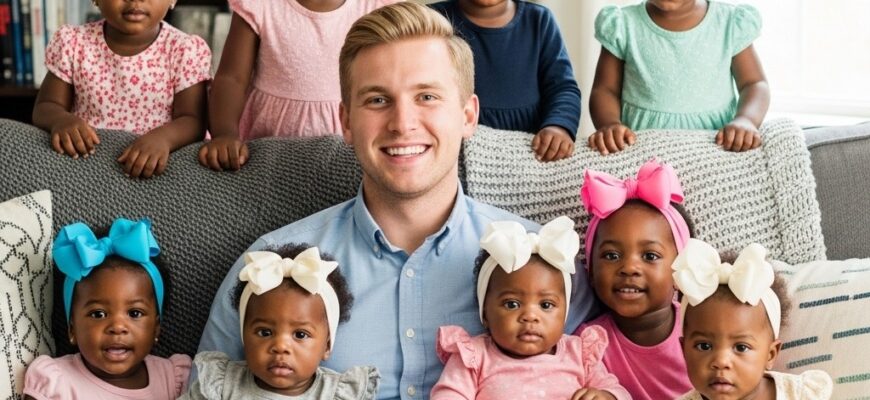In 1979, a small town in the Midwest was swept up in political change, economic hardship, and cultural divides. Amidst this turbulence, a man named Thomas Riley quietly performed an act that would ripple through decades: he opened his home to nine baby girls who had been left without parents.
They were unwanted infants, left in hospitals, shelters, and doorsteps. Some had been abandoned for their gender, others because of poverty or illness. At a time when most people turned away, Thomas—single, modestly employed, and by no means wealthy—chose otherwise.
He had no wife, no children of his own, and yet, he believed that no child should face the world alone.
The Beginning
It started with one child. A neighbor told him of a baby girl left at the county hospital with no claimants. Thomas visited, cradled her in his arms, and felt something shift inside him. He filed the papers, becoming her guardian.
But within weeks, he learned of another infant abandoned under similar circumstances. And then another. Soon, Thomas was confronted with a question few could answer: How many could one man possibly take in?
His answer was simple, though not easy: as many as need me.
By the end of that year, nine baby girls had found themselves under his roof.
Building a Family
His modest farmhouse became a haven. Cribs lined the walls, bottles stacked beside the sink, tiny clothes drying on makeshift lines. The townspeople whispered. Some called him crazy, others suspicious. But Thomas ignored them. He was too busy changing diapers, heating milk, and singing lullabies in his deep, rough voice.
He gave each girl a name and celebrated every milestone as though it were a miracle. First steps were greeted with applause, first words with tears of joy.
Money was scarce. Thomas worked two jobs: one at the local mill during the day and another repairing cars at night. His hands were calloused, his back bent with exhaustion, yet he never complained. Every cent went to food, schooling, and medical bills.
Neighbors eventually softened. They began dropping off hand-me-down clothes and extra groceries. A retired teacher volunteered to tutor the girls. The small community, once skeptical, gradually embraced the family.
Growing Up
The girls, though bound not by blood but by circumstance, became inseparable. They bickered like siblings, shared secrets in whispered giggles, and defended one another fiercely at school.
But challenges were ever-present. Each child carried shadows of abandonment. Questions about their origins surfaced in adolescence, often accompanied by tears and anger. “Why didn’t they want me?” one of the girls once cried.
Thomas would sit with them in the quiet of night and answer honestly: “I can’t tell you why they left. But I can tell you this—your worth isn’t decided by their choice. It’s decided by who you are, and who you become.”
Those words stitched wounds that could not fully close, but they offered strength.
Adversity and Resilience
In the 1980s, the mill where Thomas worked closed, plunging the family into financial despair. For a time, they lived on little more than potatoes and bread. Thomas picked up odd jobs, mending fences, shoveling snow, and hauling wood to keep the household afloat.
When one of the girls fell ill with pneumonia, the medical bills threatened to drown them. Thomas sold his truck, walking to work for nearly two years.
The girls watched all this with growing awareness. They understood sacrifice, not as an abstract concept but as daily reality. That understanding forged resilience in them—resilience they would carry into adulthood.
Blossoming Futures
As the years passed, the girls flourished. One became a nurse, inspired by the nights Thomas spent by hospital beds. Another pursued teaching, recalling the patience of the retired tutor who volunteered years before. One joined the military, carrying forward the discipline instilled by Thomas’s steady rules.
College acceptance letters arrived one after another. Thomas cried at each, proud yet terrified of letting them go. The house grew quieter as daughters departed, yet it was filled with their laughter whenever they returned.
They called, they wrote, and though they sought their own paths, the bond of nine sisters raised by one man remained unbreakable.
Forty-Six Years Later
In 2025, Thomas Riley was ninety-two. His hair had thinned, his steps slowed, but his spirit remained strong. On his birthday, the nine daughters returned to the farmhouse—now renovated, warm, and buzzing with grandchildren.
They gathered in the living room, presenting him with a large frame. Inside was a family tree—not of bloodlines, but of love. At the top, his name. Branching below, nine names, then more beneath them: spouses, children, grandchildren.
Tears welled in Thomas’s eyes as he traced the lines with his finger. “I started with nothing,” he whispered, voice breaking. “And now look at this.”
One daughter knelt beside him. “You gave us everything, Dad. You taught us family isn’t about where you come from, but where you’re loved.”
Legacy
The story of Thomas and his nine daughters spread far beyond their town. Local newspapers wrote about him. Later, documentaries featured the family as a symbol of resilience and compassion.
But to Thomas, the legacy wasn’t in headlines or praise. It was in the laughter of his grandchildren, the embrace of his daughters, and the knowledge that nine abandoned baby girls had grown into women who carried love forward into the world.
In 1979, he had made a choice—a choice to open his heart when the world had turned its back. Forty-six years later, that choice had blossomed into a legacy that proved one truth: family is not defined by blood, but by the courage to love when no one else will.
